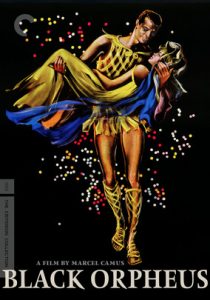Black Orpheus-1959
Director Marcel Camus
Starring Breno Mello, Marpessa Dawn
Scott’s Review #689
Reviewed October 8, 2017
Grade: A
Black Orpheus is a 1959 French film made in Brazil, honored with a win in the coveted Best Foreign Language Film Academy Award category in 1960, considered somewhat of a surprise to win.
The film is adapted from the well-known Greek legend of Orpheus and Eurydice. It is now set in Rio de Janeiro during the festive celebration of Carnaval.
Black Orpheus, starring almost all black actors and providing a look at life on the streets of Brazil, is vibrant and filled with lively songs and dances.
The setting is key to the film as the beauty and merriment are mixed with loss and tragedy- loads of exterior shots of Rio de Janeiro flesh out with many shots high atop a hill in a quaint village where all of the characters live most in very close proximity to each other.
Like Shakespeare’s Romeo and Juliet, the film is romantic and lovely, but the story is also mired in jealousy and drama amid the dancing and many celebrations.
Many of the actors, lead Breno Mello and Marpessa Dawn, are non-actors, cast undoubtedly because of their gorgeous, authentic looks. Still, surprisingly, both are phenomenal in their roles and perfectly cast.
Wholesome Eurydice (Dawn) arrives in Rio de Janeiro by trolley driven by Orpheus (Mello), intent on visiting her cousin, Serafina. There is an instant attraction between the young man and the woman as he provides directions to her cousin’s village, which is also his.
Orpheus, however, is engaged to be married to his possessive and demanding fiance, Mira. He is less enthused about the impending marriage and would rather fix his guitar than buy Mira an engagement ring.
As the Carnival festivities get underway, Orpheus and Eurydice give in to their mutual attraction and dance the night away while subsequently trying to avoid the wrath of Mira and avoid a mysterious costumed man who has been stalking Eurydice since she escaped her village and fled to Rio.
Eurydice is terrified that the man may want to kill her, and his motivations are unknown. His character is particularly frightening as he is known as “Death” and dons a tight skeleton costume.
The tragic conclusion, culminating in an incredible chase scene in Orpheus’s trolley station, is fantastic. The morbid ending, based on the legendary Greek tale, is unsurprising. However, the Romeo and Juliet comparisons are still heartbreaking and challenging to experience, most notably the final scene atop a cliff.
The scene is shocking and brutal as the lovelorn couple topples down a hill together at the hands of another central character. However, as they are intertwined in each other’s arms, the scene is also gorgeous and a confirmation of true love and artistic beauty.
Some accusations of racial stereotypes within this film have abounded over the years, mainly the depiction of Brazil being inhabited by party-going, sex-crazed people.
I find the film a masterpiece and the type of cinematic experience to be enjoyed rather than over-analyzed.
The almost nonstop musical score created by Luiz Bonfa and Antonio Carlos Jobim is to die for and is an enormous part of what makes the film so engaging and entertaining.
Perfectly capturing the spirit of a jovial, cultural environment, Black Orpheus (1959) spins a riveting, heartbreaking tale of love amid a musical.
Tragedy, art, true love, romance, and death are all elements captured in this excellent film.
Oscar Nominations: 1 win-Best Foreign Language Film (won)
